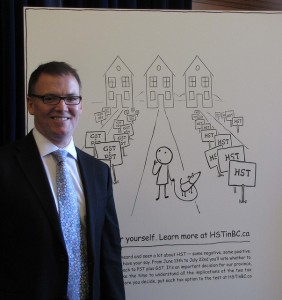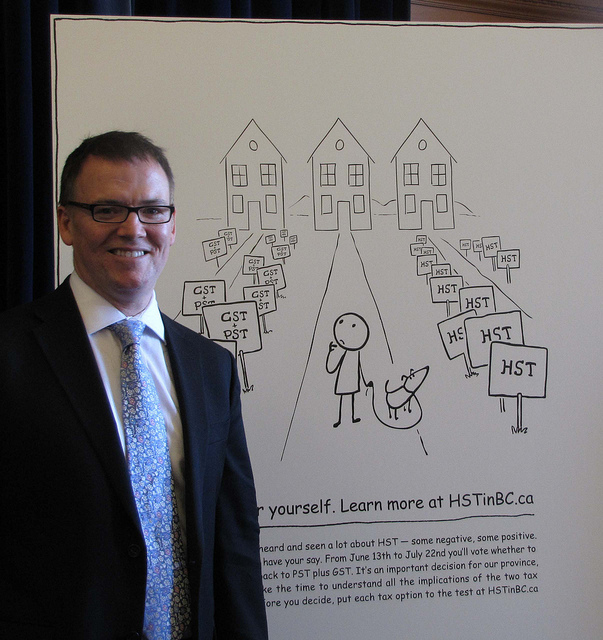Date Posted: May 19, 2011
Print Edition: May 13, 2011
By Trevor Fik (The Cascade) – Email
 By July 22, voters across British Columbia will have cast their ballot to uphold or repeal the Harmonized Sales Tax that has been in place in the province since July 1 2010.
By July 22, voters across British Columbia will have cast their ballot to uphold or repeal the Harmonized Sales Tax that has been in place in the province since July 1 2010.
While government promotion and handling of the tax has been nothing short of a catastrophic failure, the initial economic benefits from a $1.6 billion federal grant have many people worried about the effects of cancelling the unpopular tax.
While trying to sell the HST to the citizens of British Columbia, the government has offered nothing but inaccurate estimates of the benefits of the tax while downplaying any potential harm.
The breadth of the government’s imprecision about the tax was brought to light by a government-funded panel designed to explore (and as the Liberal party hoped, celebrate) the effects of the HST. What the panel found has only served to lessen the population’s trust in an already embattled government and increase scepticism about a tax that has been dubbed the “Hated Sales Tax.”
The panel found that those making less than $10,000-a-year were the only people who stand to benefit from the tax in terms of rebates. Families whose income is in the range of $70,000 or above (or the majority of families in the province) will pay an additional $527-per-year. This is far above the government-estimated $107-per-year, and is only the tip of the iceberg in terms of massive discretions between government-predicted effects of the tax and reality.
Another one of the key selling points of the HST was the positive effect on economic growth and job creation the tax was expected to have.
To a province reeling from the effects of a recession, this particular idea was music to many people’s ears. With a high unemployment rate and low job prospects for many people, any way to create new jobs was welcomed by the province.
However, what the HST has amounted to in terms of job creation has been far below the expected amount. Last year, the HST resulted in the creation of only 3,000 new jobs, far less than the government’s original prediction 113,000 new jobs by 2020 when extrapolated over nine years. Estimations now range somewhere in the more conservative area of 24,400 jobs.
This gross over-estimation was yet another lie in a whole string of fabrications being sold by the Liberal government and their HST spin crew. They cannot hide the panel’s findings that while taxpayers are paying an extra $1.33-billion-a-year as a result of the tax, businesses are paying $730 million less.
As if to add insult to injury, the government has commissioned an additional $1.7 million of taxpayer money in an attempt to “inform” the public of the HST’s benefits. Translation? Pouring more money into the HST sinkhole in an attempt to clog the bad press and even worse public reputation the tax has garnered.
What the Liberal government has failed to understand is that the province is not entirely upset about the tax itself, but it is upset by the way Gordon Campbell and his sneaky Liberal government implemented the tax when they had given every inclination they would not.
Christy Clark and her platform of positive economic change and growth would be badly hurt by a repeal of the HST tax, and rightfully so. However, the real losers in a repeal decision would be the economy of British Columbia and those who support it: the population. While the government officials feel free to roll the dice on the province’s fragile economic state, the $1.6 billion federal grant given as a result of implementing the HST would likely have to be repaid. That on top of the 18-24 month delay in getting back to the provincial sales tax, along with the high cost of such a return (hiring tax collectors, paper work, etc), this endeavour by the government will have proved to be a costly one.
While positive effects of the tax such as a more competitive economy, greater export, and a larger foreign investment in British Columbia cannot be denied, when the average person is not seeing any of these promised benefits firsthand in the form of cheaper goods or more job opportunities, the resulting vote will register as damned if you do, damned if you do not to the people of BC.


